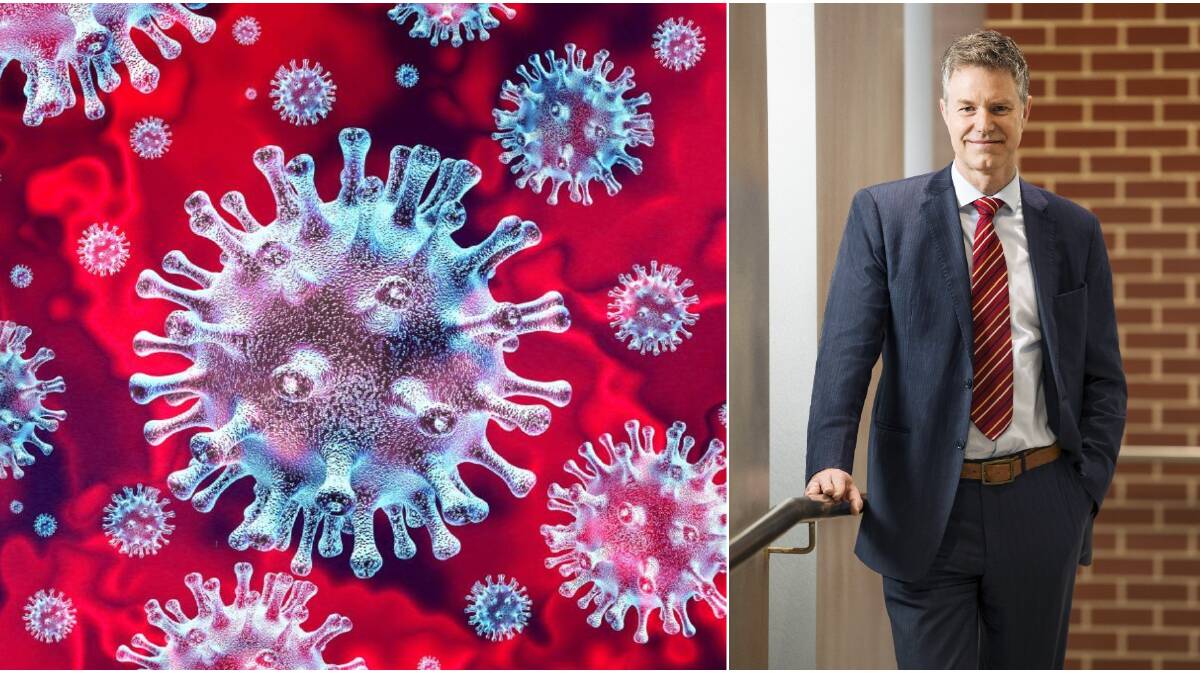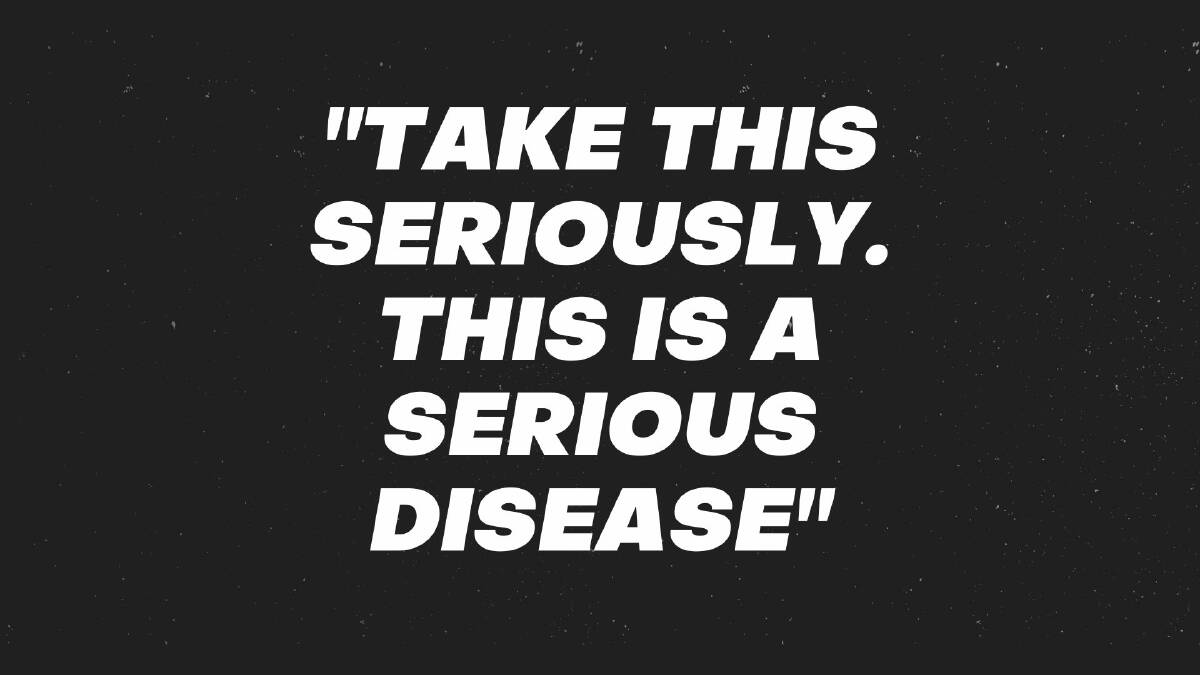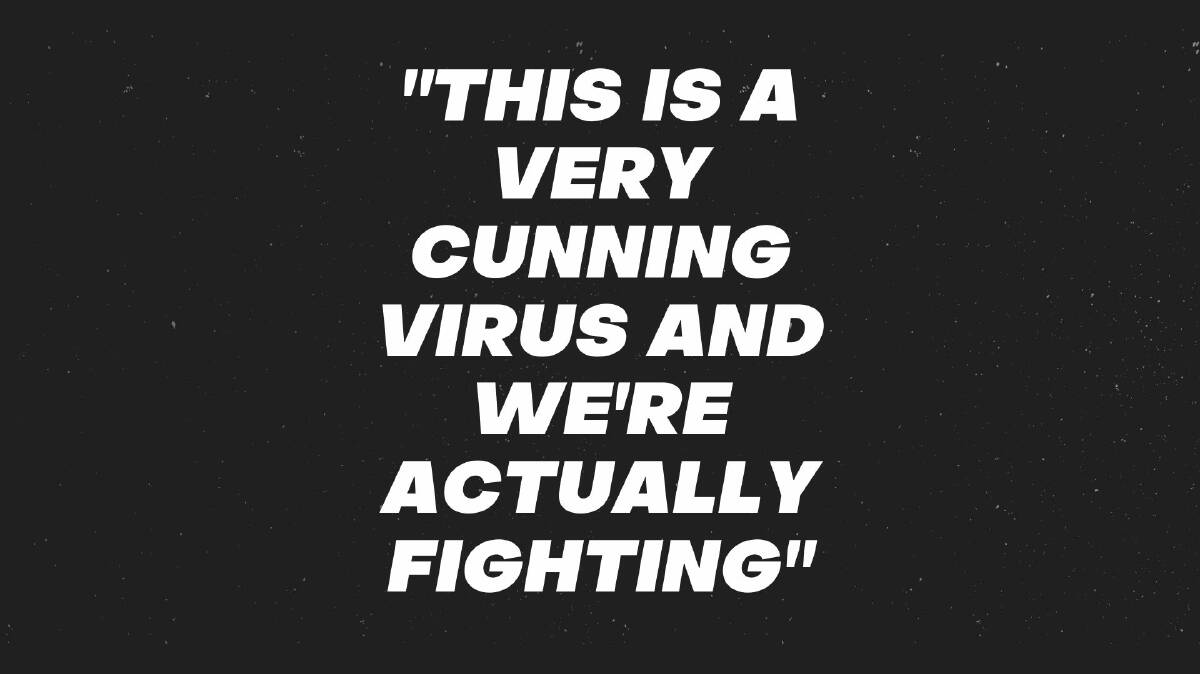
"We have never battled anything like this in the history of humanity."
Subscribe now for unlimited access.
or signup to continue reading
That's the sobering message from Wimmera-raised health and biosecurity expert Dr Rob Grenfell, who's on the frontline of the fight against COVID-19.
He envisions rollercoaster surges in cases for months to come, social distancing to become the new normal and holds doubts about large events and community sport returning anytime soon.
Since the pandemic began, Dr Grenfell - the director of health of biosecurity business at CSIRO - has led a team of around 50 scientists working to develop potential vaccines.
Though his team has celebrated breakthroughs and the mission to find a vaccine has heralded pioneering scientific feats, the former Natimuk GP was pragmatic about the situation Australia finds itself in.
"The thing with doing social distancing and flattening the curve is you actually get surges of disease coming through, and we are actually living that moment here (in Victoria)," Dr Grenfell told attendees at a community Q&A session hosted by the Horsham Rural City Council on Thursday night.
"This was predictable, what was going to happen. Ok the circumstances for how this happened you can make a lot of conjecture about, but the point is the virus has not gone away.
"It's still here. It never went away, we just brought things under control, which to a degree gave us a little bit of complacency.
"It's important to understand that (surges in cases) may repeat again until we have much better control measures than social distancing and public health measures. That's pretty sobering."

Isolation is the most significant preventative measure people can take against the potential spread of the coronavirus, Dr Grenfell emphasised.
As debilitating long-term impacts of the virus become clearer, he stressed people should "start behaving themselves" and "use common sense."
"I think the one thing we have to keep urging is to take this seriously, this is a serious disease," he said during the council's webinar.
"What's appearing now is what this disease does to you in the long term.
"A lot of people are getting permanent fatigue, lung damage, kidney damage, heart damage, even also neurological damage, strokes and clotting problems.
"The virus has spikes like you see on pictures, and they bind with things called the ACE-2 receptor, that we actually have on our lungs.
"By binding to those cells, it then enters the body...it actually hangs around more on the tissue, so it certainly binds into the lungs.
"At that point, your immune system - around day 10 - recognises that something untoward is going on and what it does is starts attacking the cells that have got the virus in them, which are your cells and the lung damage gets worse.
"Now, the ACE-2 receptors are found in other areas; parts of the brain, the heart, kidney, liver and also a few other organs.
"In a sense, the virus infiltrates your body. Your immune system takes 10 plus days to recognise something is going on, and then you enter into - if you are - a serious phase of infection where your body is starting to cause harm to you.
"It's really a wait and watch and support sort of episode with the virus.
"This is not a nice disease to catch, and the important thing is don't catch it.
"In fact, start behaving yourself, which is really a message I can not stress enough.
"If you've got symptoms you isolate and get a test. If you're waiting for a test result, you isolate until you get a result. And if you're positive, you isolate until you're told you can stop. It's pretty simple."

The information on the cycle of catching COVID-19 and then becoming infectious paints a bleak picture.
"If you're exposed to the virus, and you catch it, it takes around two-to-five days to get symptomatic. That's if you do (become symptomatic)," Dr Grenfell explained in the webinar.
It takes around 10 days on average for the virus to incubate.
"What that means is through that period you might be infectious at the early stages, and it's touted it could be two-to-three days where you're not actually symptomatic. That's scary," Dr Grenfell said.
"That means if you've been in contact with somebody else who's got it you do need to be isolated as well. That's the reason why this virus is so cunning and actually takes off.
"You are not immune to this if you're a baby right through to if you're an adult. The hospitalisation rate for anyone over the age of 45 on a global figure is somewhere around 15 per cent."

Information about the initial COVID-19 outbreak in China was quickly published in medical journals and bolstered by accounts from doctors in Italy, the United States, and the United Kingdom giving health experts a clear picture of what they were facing, Dr Grenfell explained.
COVID-19 is what Dr Grenfell coined a "zoonotic infection"; a virus shared with other animals, like how SARS came from bats then through civet cats and MERS' link with camels.
"We know that COVID-19 came from bats, but we don't know which animal was the intermediary one. We do know that is certainly the path that it came from," Dr Grenfell said in the webinar.
"My team has actually been doing a lot of work on SARS and MERS and understanding it, which was a good thing because it meant that the virus hit they actually had some tests to do."
Dr Grenfell noted his team had discovered that changes in COVID-19's genetic code were not signifiant enough to render it different from different versions of coronavirus, which means vaccines in development would work for targets.
Though, he warned COVID-19 was "very persistent on surfaces" and could survive for days on stainless steel, wood, fabrics and glass.
"This is a really cunning virus, and we're actually fighting," Dr Grenfell said.
"This is the reason why when we talk about what you have to do as citizens - the idea of washing hands and washing surfaces - is really important."

In early June the state recorded nearly two straight weeks of single-digit increases in new cases. A month later, more than 5 million Victorians are in a second lockdown, and daily tallies in the hundreds are the new normality.
Dr Grenfell said rollercoaster surges would become a reality until there is a way to combat the virus.
"Until we have an effective vaccine - which if everything goes well, we certainly won't find seeping into general use until the mid part of next year - it means that that we will be getting surges on a repeated basis," he said.
"This is going to become part of what we actually have to do.
"That's a pretty negative answer, but that's the reality at the moment until we can actually get this under control.
"If we're lucky and we get a vaccine through, and it starts being administered across the world and particularly in Australia we may find ourselves freeing things up.
"But, bear in mind there are 25 million of us. That means a whole lot of vaccine doses we're going to do, and administering and immunising an entire population is not an easy task.
"The mechanics of doing all this stuff is what's going to hold us back.
"We will be social distancing, and avoiding trying to contaminate ourselves and our friends and family for a good time through next year, even in a positive scenario."

Having spent 13 years working as a GP in Natimuk, Dr Grenfell knows how much the annual Natimuk Show means to the local community.
The show was cancelled this year - in line with most in the Wimmera - and when asked if plans could be made for next year's event, Dr Grenfell revealed a sad new reality.
"I can't give you a positive answer, because we're going to get surges continuing," he said.
"Will we have a show in March? I don't know. Will we actually be opened up and having a show like we used to? The answer is probably not if you're a betting person.
"The reality here is that it is unlikely we will have things under control over the next 12 months that will allow us to have very large events and that's not good news to hear."
The prospects of football and netball returning soon weren't painted in a good light, either.
"You're making me weep here," Dr Grenfell said. "I know how important footy is to all the small towns and communities around here and unfortunately I can't give you a positive answer.
"We're just going to have to wait and see what happens with this virus because it is still going to be around at that time.
"Football and community support is vital for the strength and wellbeing of our communities, but we're going to have to keep working out how we might do it so it's safe.
"At this stage, I don't see a way of that happening."

During his time in Natimuk, Dr Grenfell worked as a public health specialist and assisted with state and national projects, that required him to study the history of pandemics.
Though the COVID-19 pandemic is still in its infancy, the threat of history repeating is alarming, he said.
"Every time we have a pandemic, we have social disruption. We have riots and community disharmony," Dr Grenfell said.
"We're seeing that all across the globe. We're seeing all sorts of mysterious behaviour from nation-states but also protests for all sorts of reasons.
"During the Spanish Flu we actually had riots in Sydney and Brisbane, so we hope we don't head into that area, but I must say what is going in the US is quite frightening.
"The other things we learned was it took around three or more years for peoples' behaviour to start to move back to what they were doing beforehand.
"I guess for (Australia) because we've been so good at controlling this and our fatality rate (is low) most of us don't know someone who's got the disease or has been affected by it, and most of us certainly don't know someone who has died from it.
"It's not as real as it is, for say, my friends and colleagues in New York or those of us who are talking with those across Europe, and certainly in the UK.
"In one sense the complacency and denial are actually a reflection of what you see and what you don't see.
"Pandemics do affect the bottom line. They do affect budgets. They do affect the way we actually function in society with work and everything else.
"We're in for a rocky road, and it's something we need to take quite seriously and work towards."
IN OTHER NEWS TODAY:
Did you enjoy this story? We depend on subscription revenue to support our journalism. If you are able, please subscribe here. If you are already a subscriber, thank you for your support.


